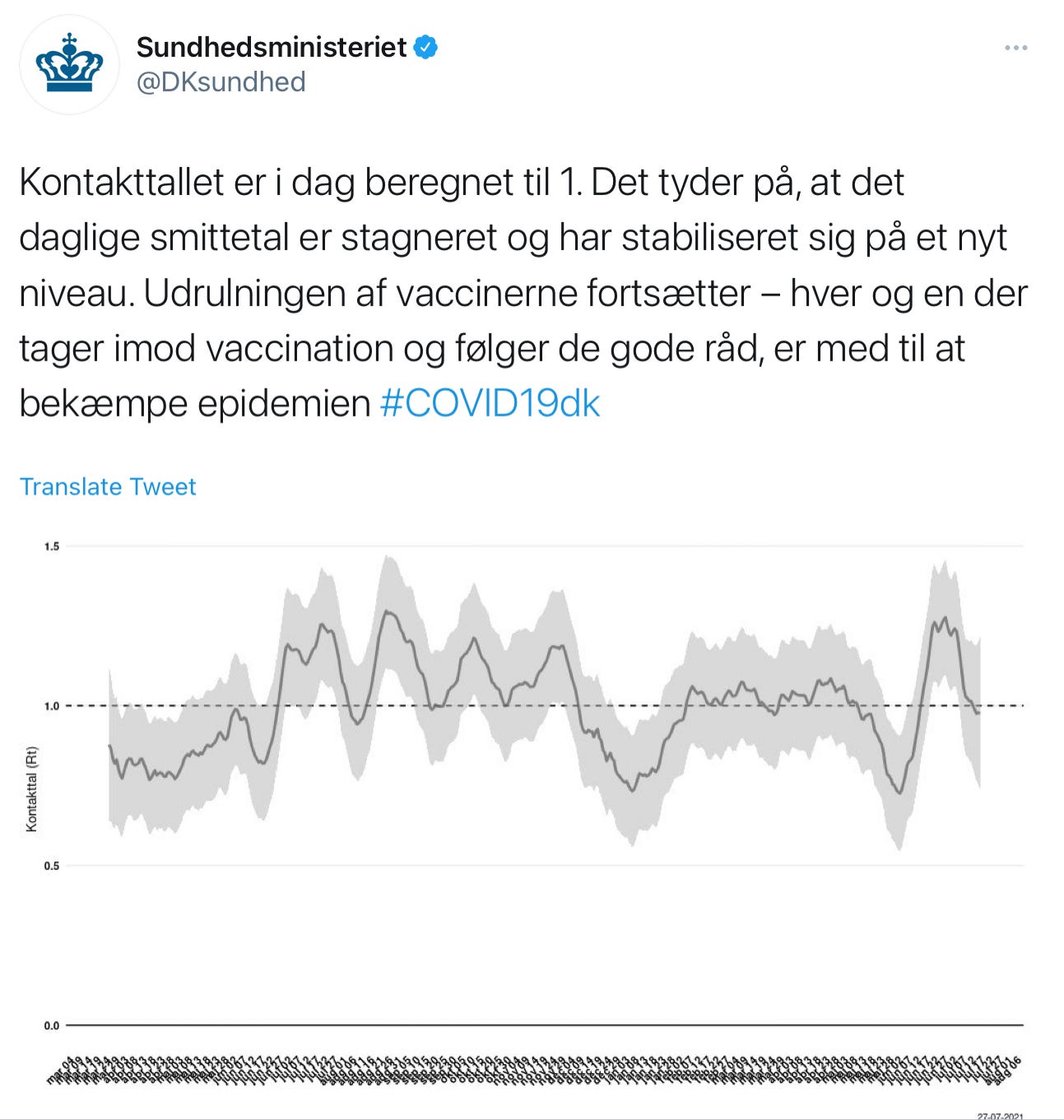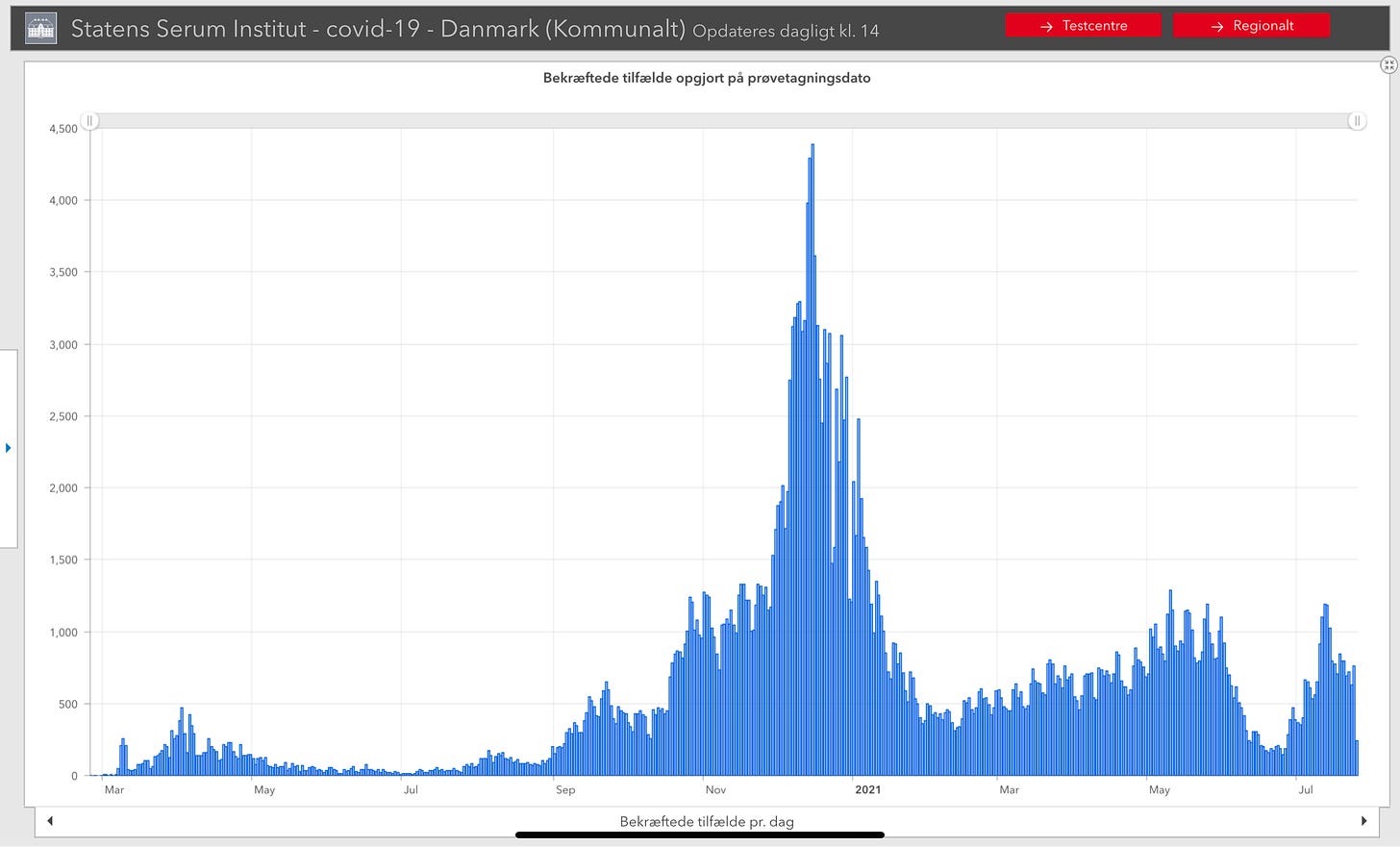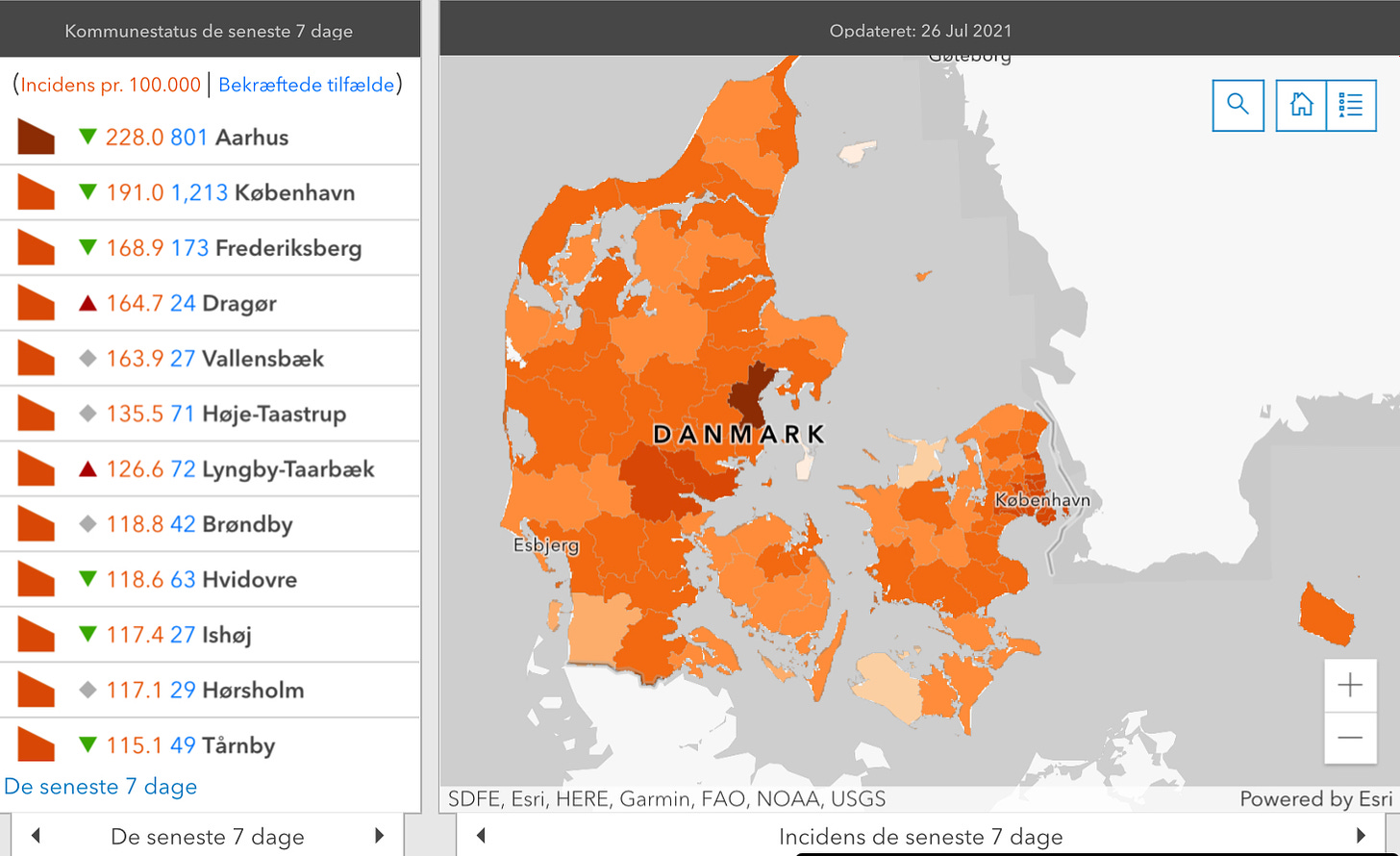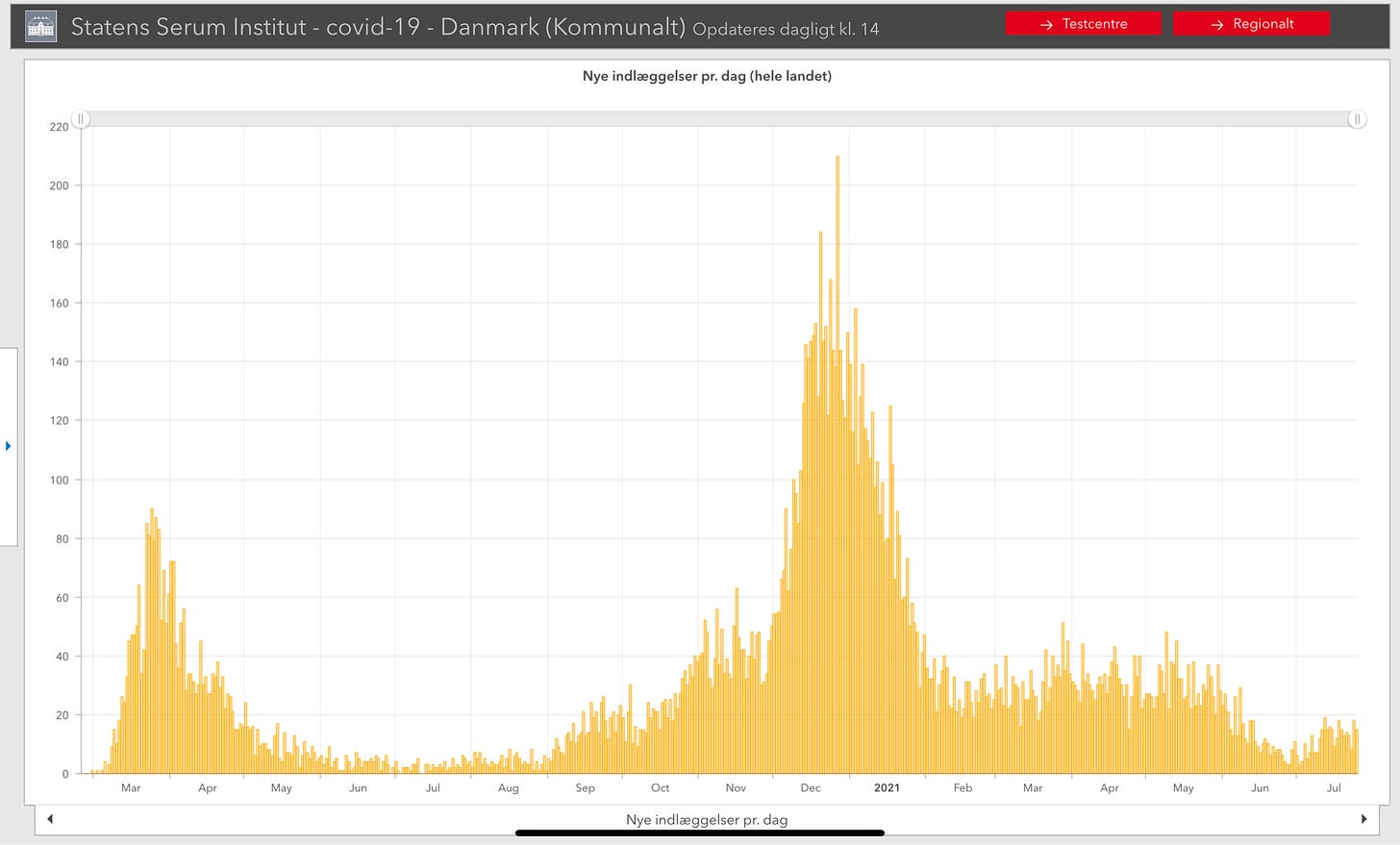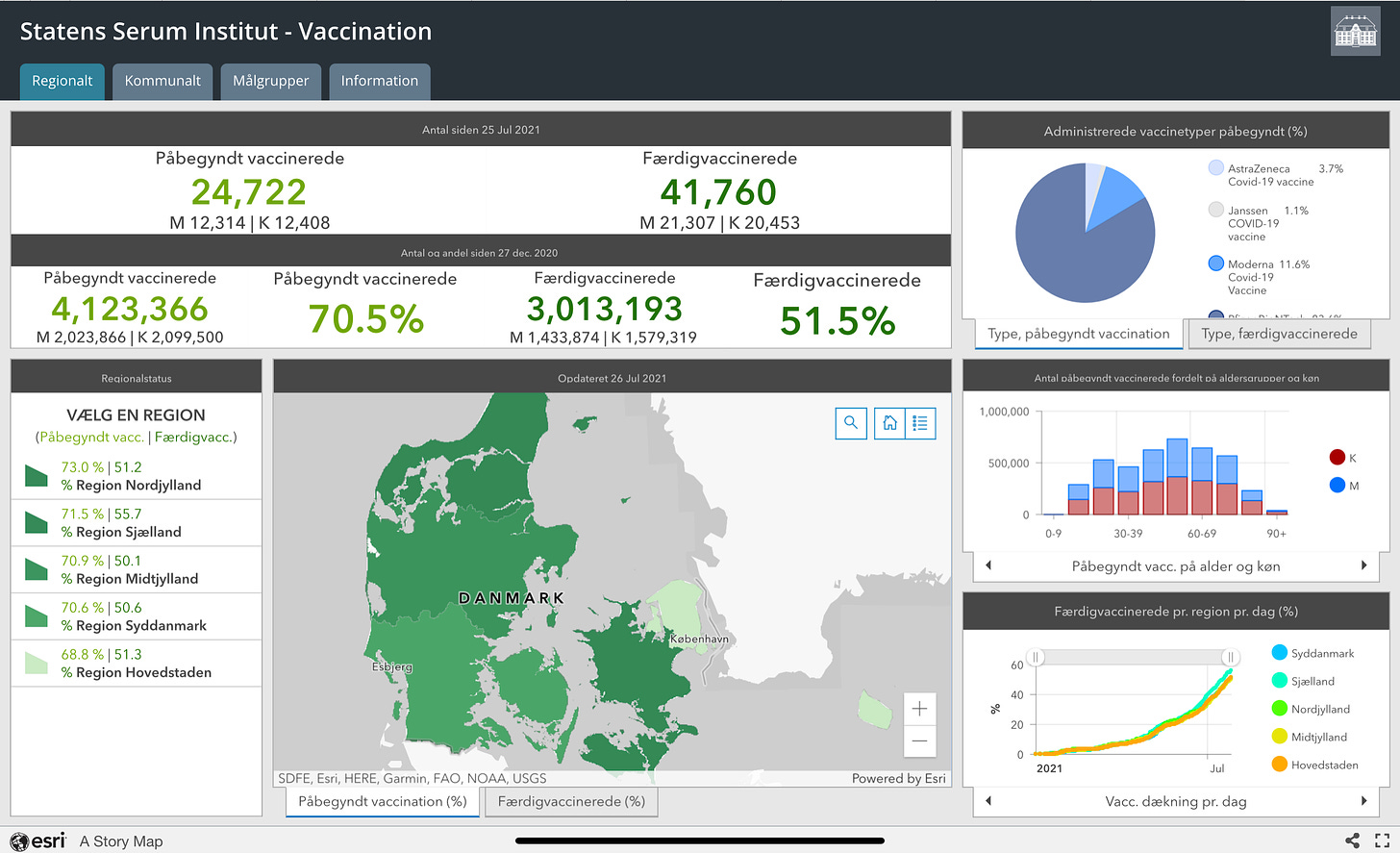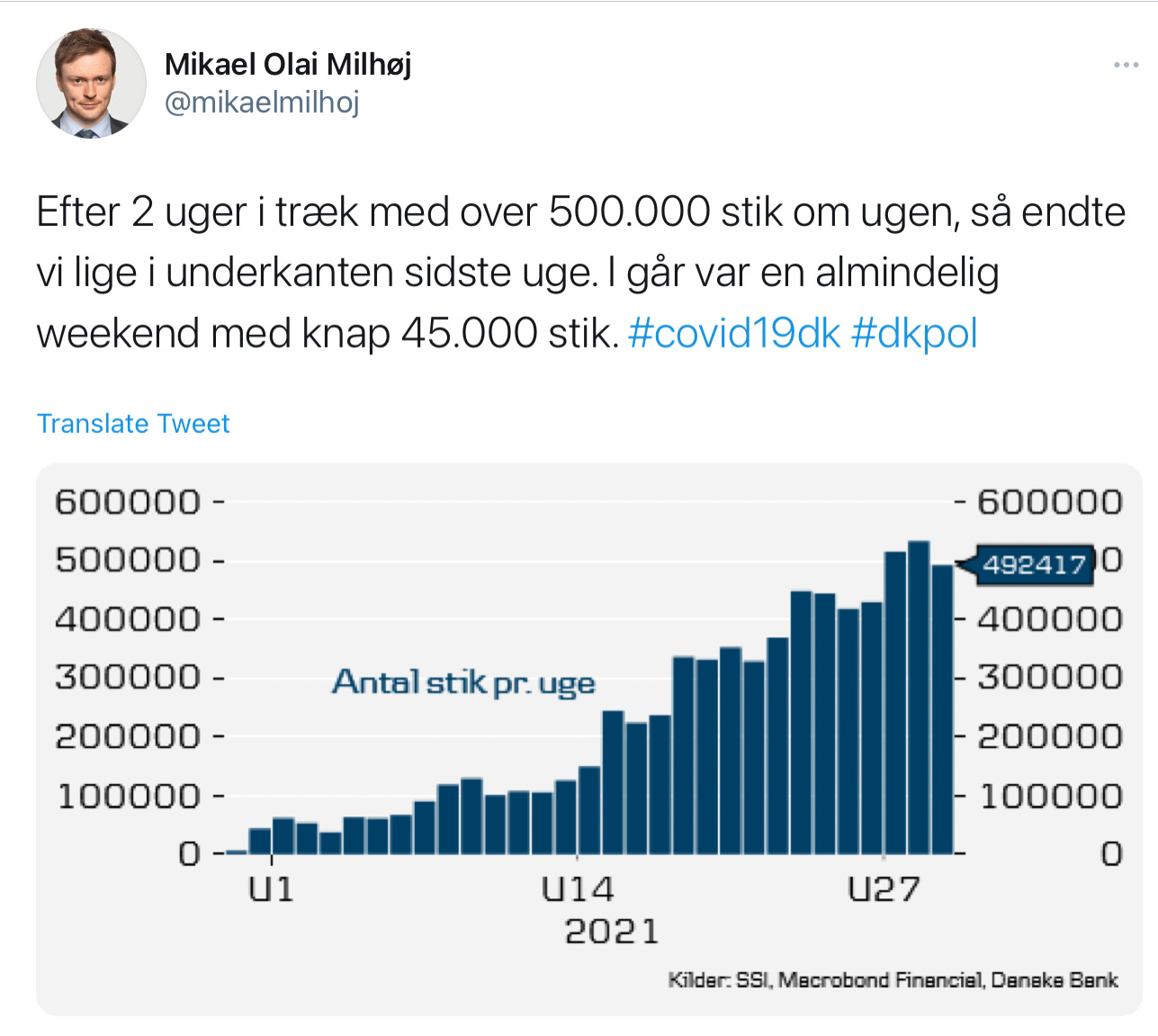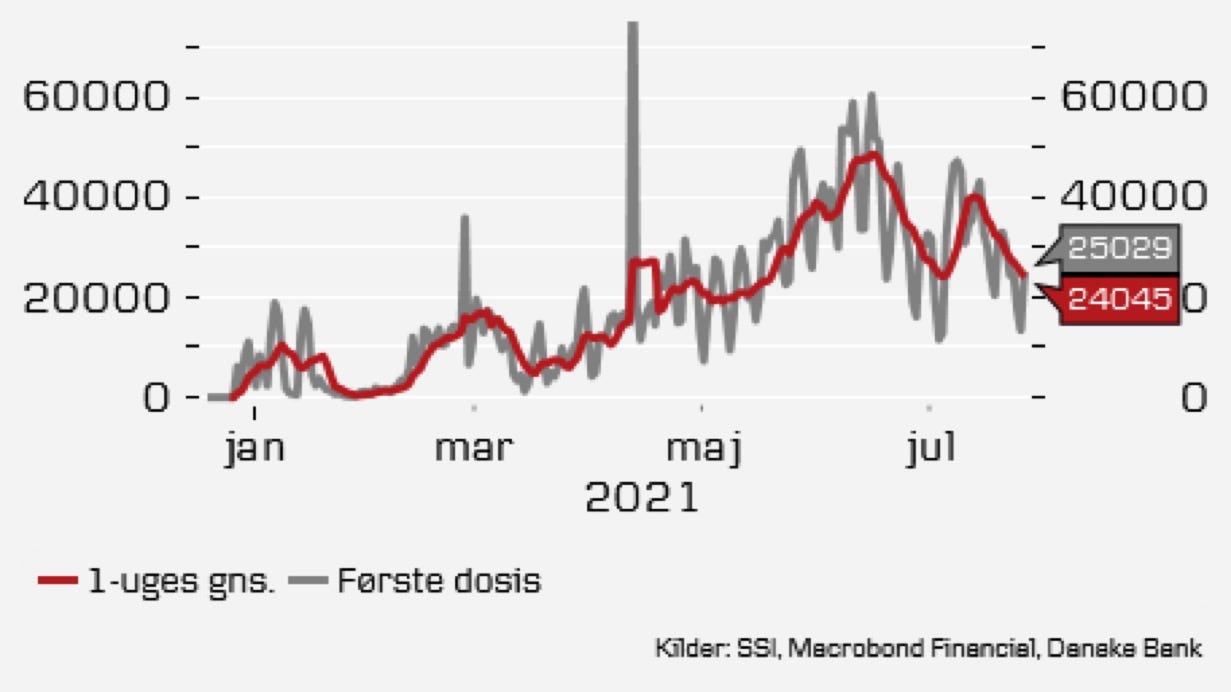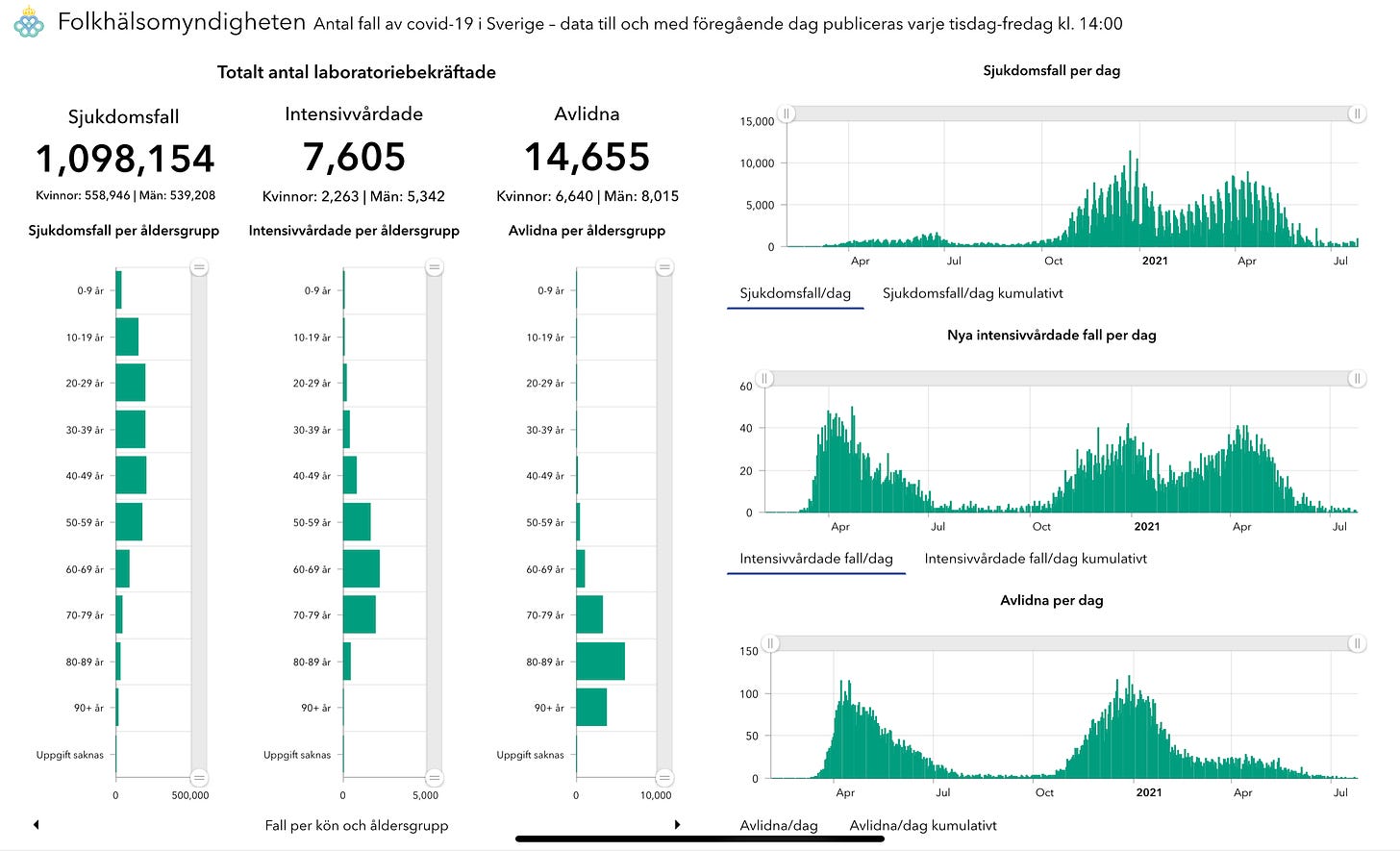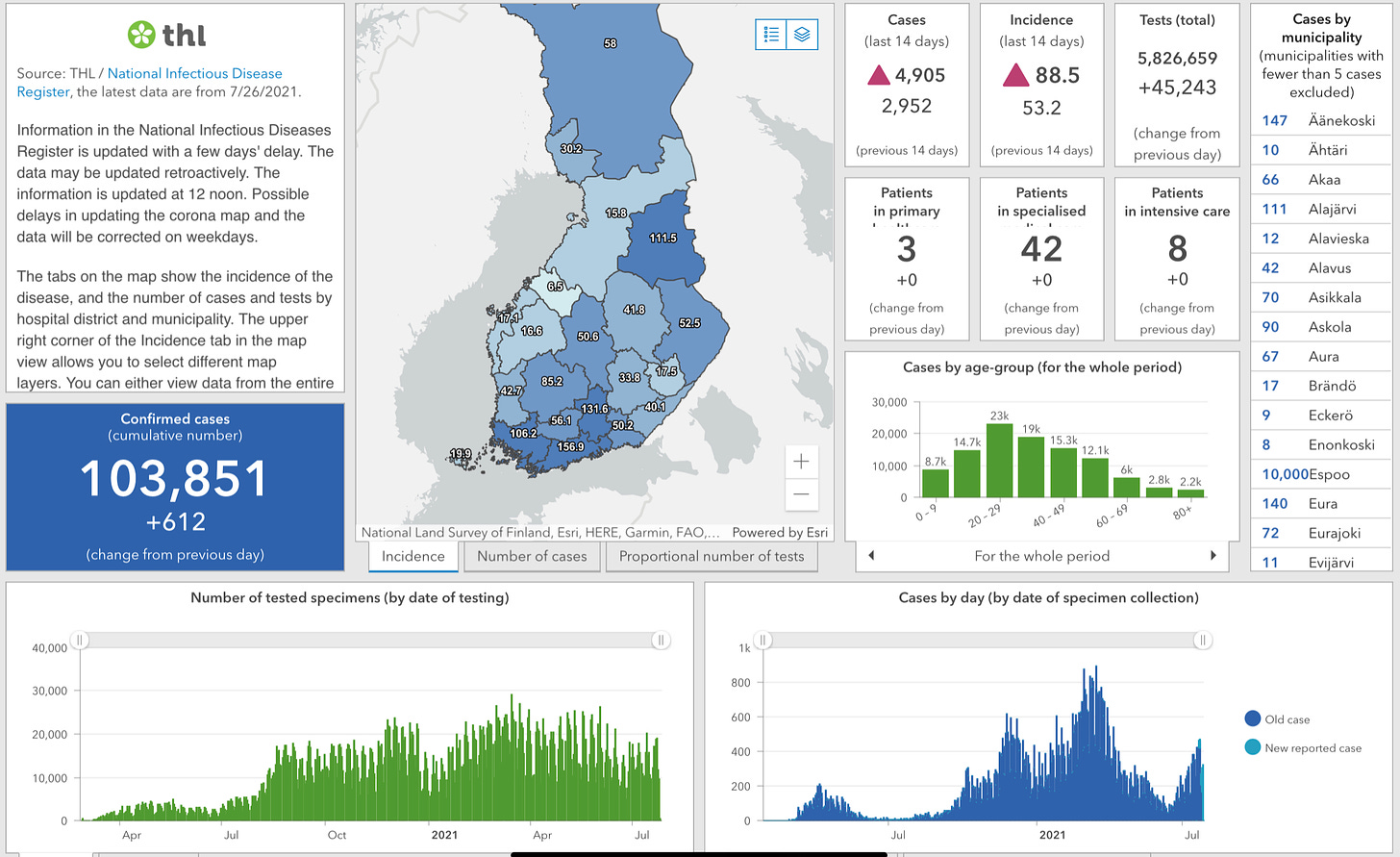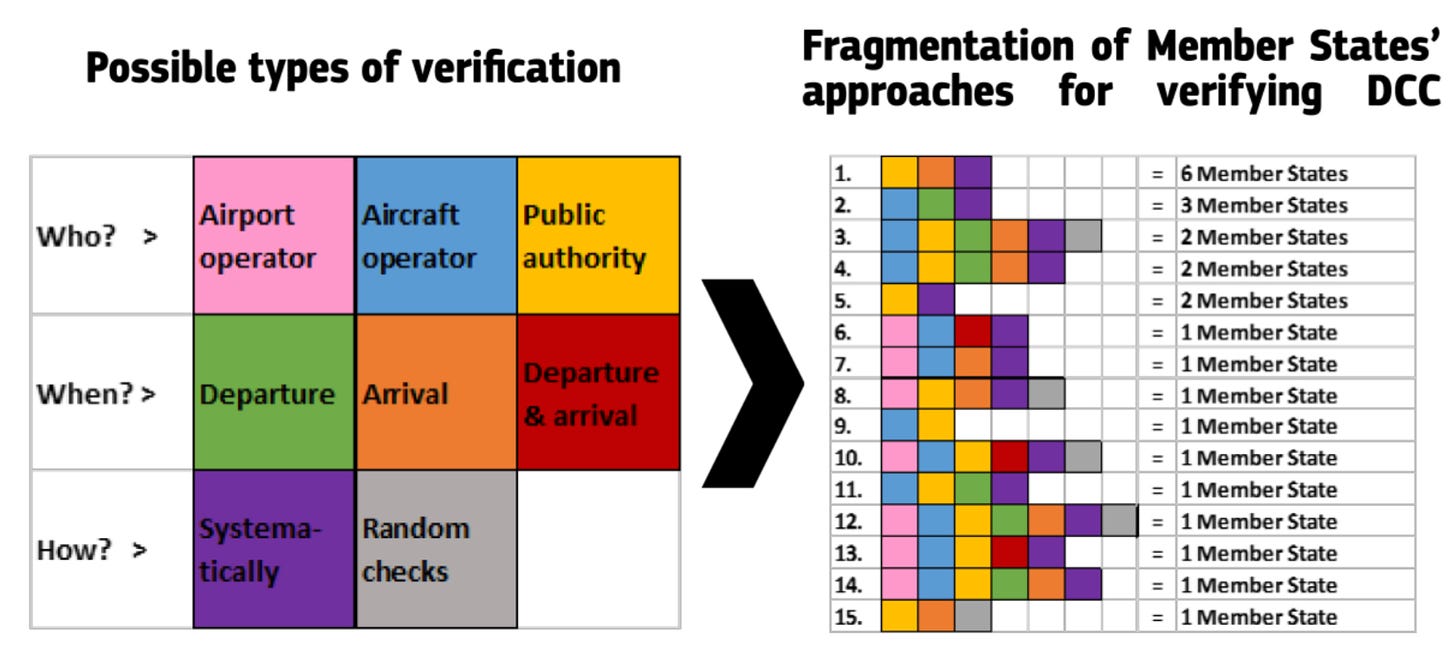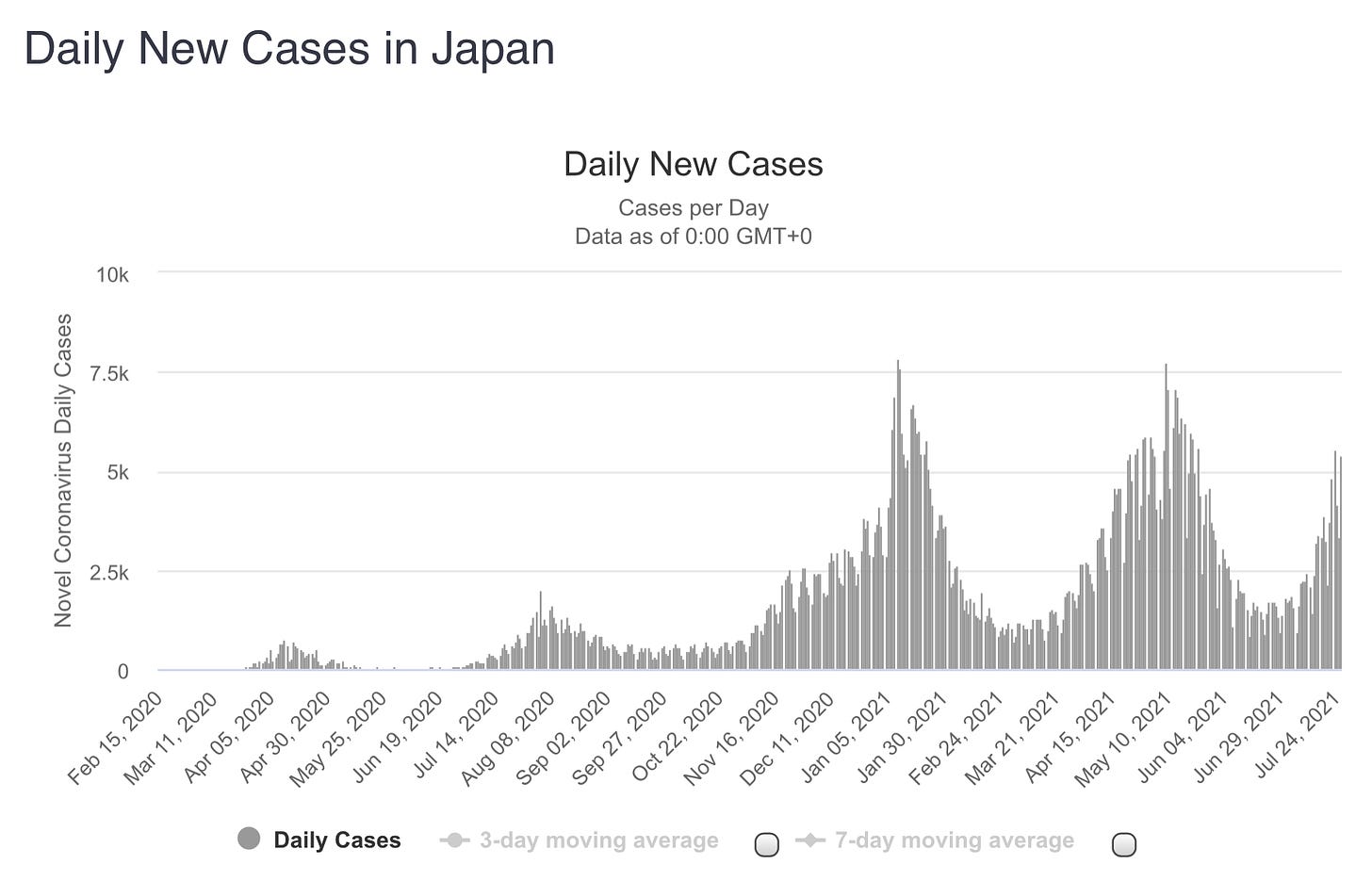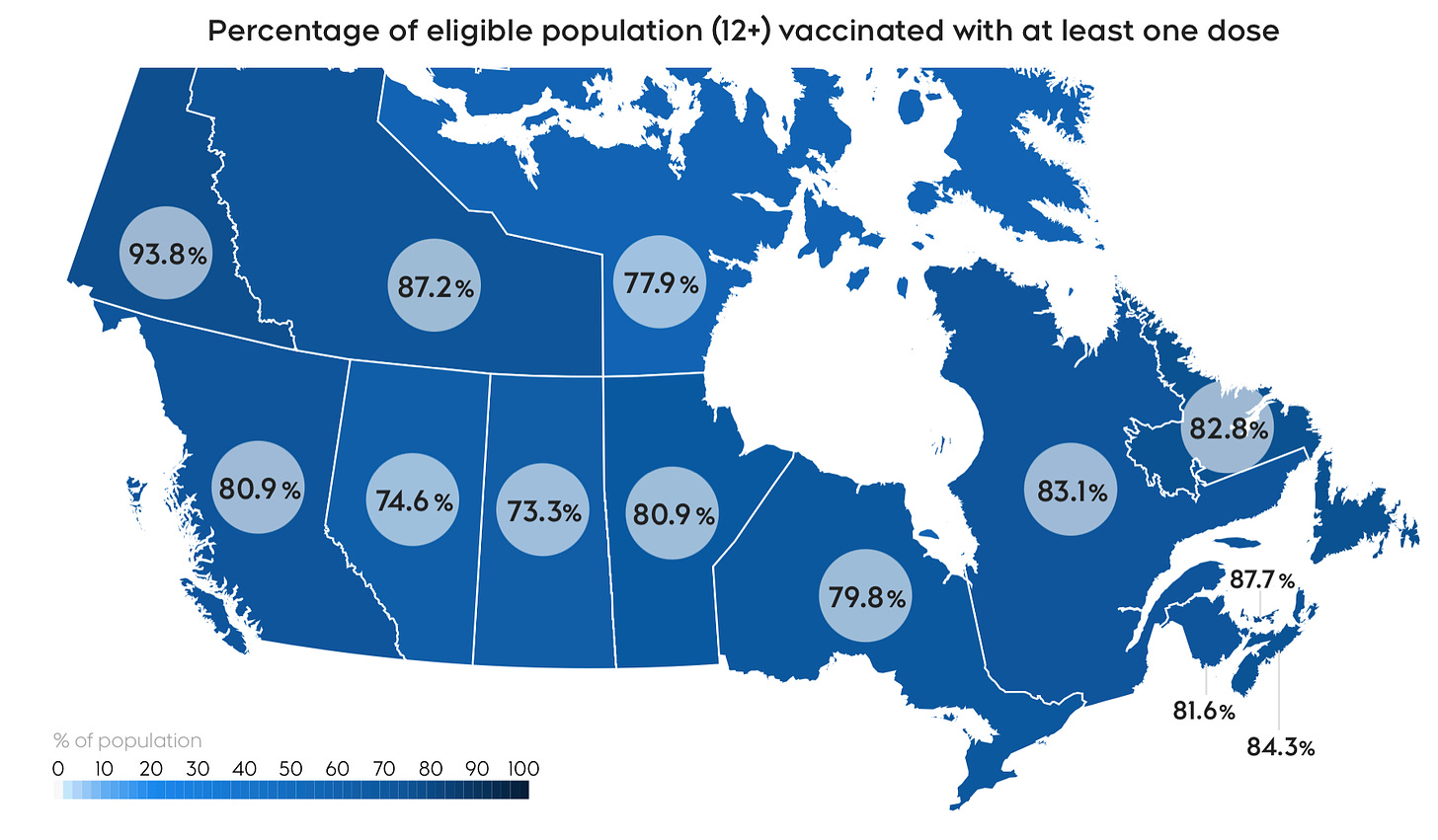🇩🇰
In Denmark, 22% of all Delta variant infections are among those who have had one vaccination dose. The number comes from the Staten Serum Institut who examined infection rates among those who were vaccinated between March 1 to July 13.
Head of Department Palle Valentiner-Branth:
“So even though people have been vaccinated and have been given a coronapas, we still see a lot of Delta variant infections in this group. Therefore, people should be aware that they can still become infected, and follow the general advice on infection prevention. And do not wait too long to get a second dose.”
The Institut also found some Delta variant punch through after two doses.
“A low number of breakthrough infections has been found, corresponding to 0.1% of those vaccinated throughout the same time period. But if you get a breakthrough infection, your relative risk of becoming infected with the Delta variant is higher than that from the Alpha variant.”
The SSI says other international studies show lower levels of protection and efficacy against the Delta variant after one dose, no matter what vaccine is used.
Despite this, the Danish Ministry of Health has told DR that there won’t be any changes to the coronapas. A first dose will still give people all the freedoms with the coronapas as those who are fully vaccinated.
-
The Danish Health Ministry says the COVID contact number (reinfection rate or R0) has declined for a second straight week. It was 1.3 two weeks ago, it then dropped to 1.1 last week and now has inched down further to 1.0 this week. This is really good news.
-
Fewer than 10% of the Danish population has been infected with the coronavirus as of the end of May, according to the latest prevalence study from the Staten Serum Institut. The study found 8.6% of the population has had COVID since the beginning of the pandemic, up from the previous prevalence study, which found 7% of the population had been infected.
The SSI says 8.6% of the population equates to about 386,000-488,000 people over the age of 12 years old.
Senior Researcher Steen Ethelberg:
"As expected, the proportion of the population that has antibodies to COVID has increased slightly since the last survey from the end of March. This shows that the epidemic has been fairly stable from March to May.”
The study also found that very few infections went undetected in Denmark thanks to its very robust testing regime.
The prevalence study is designed to specifically measure population-level infection spread. The Institut says if you factor in vaccinations, then 54% of the Danish population has antibodies protecting against the coronavirus.
Vaccination levels are now so high in Denmark there is no longer a need to conduct anymore prevalence studies.
-
Denmark has added 1,331 new COVID infections and four more coronavirus deaths in the last 48 hours. It reported 772 corona cases yesterday and another 552 today.
Yesterday, 179,395 total corona tests were done - 46,322 PCR and 133,073 rapid - for a (PCR only) positivity percentage of 1.19%, which is high.
The number of Danish kommunes with a COVID incidence rate per 100,000 citizens over 100 is at 18. Of the eighteen, only one, Aarhus, has an incidence rate over 200.
-
COVID hospitalizations (61) have edged upward (+1) while the number of infected people in an ICU (10) is unchanged and of those, the number on a ventilator (5) dipped slightly (-1).
-
On the vaccination front, Denmark has passed another vaccination milestone, with 70% of the total population now having one vaccination dose - 51.5% of the population is now fully vaccinated.
Yesterday, there were 66,482 total inoculations done, which is lower than seen in previous weeks during the weekday.
Denmark couldn’t make it three weeks in a row. Danske Bank Chief Analyst Mikael Olai Milhøj notes that after two weeks of seeing over 500,000 vaccinations administered last week, the number dipped to 492,417.
Milhøj says the number of first inoculations per day across Denmark has also begun to drop.
-
Region Syddanmark has released its latest weekly vaccination summary. The region has 75,380 vaccine doses this week. There are 51,480 doses of the Pfizer/BioNTech vaccine, with the remaining 23,900 doses coming from Moderna. This is down from last week’s 100,680 doses.
The doses on hand will continue to fuel vaccination efforts for those aged 12 to 64 years old. The health region s also opening up vaccinations for pregnant women and mothers who are breastfeeding.
So far, 853,412 people in Southern Denmark (69.6%) have received a first dose, while 605,228 people (49.4%) are now fully vaccinated.
🇩🇰🇪🇺🇺🇸
Denmark was name-dropped at a White House briefing today and not in a good way. White House spokesperson Jen Psaki was asked if the United States would ease entry restrictions on travelers from the EU. She said there are no plans to do so due to the threat of the Delta variant.
“We want to maintain the existing travel restrictions at this time. Due to the Delta variant, the number of infected people in Denmark is increasing, especially among those who have not been vaccinated.”
🇸🇪
Sweden has added 2,396 infections and another four deaths since Thursday of last week.
There are 16 people being treated in an ICU across Sweden, which is four fewer than last week.
To date, there have been 6,297,397 1st doses (76.9% of the population) and 4,024,593 2nd vaccine doses (49.1%) administered.
-
Another warning about travel-related coronavirus infections in Sweden. In a press release, Örebro County says young people who are unvaccinated are heading out to vacation in European hot spots like Spain and coming home with COVID.
Assistant Infection Control Doctor Lisa Vennberg says young people need to take some responsibility.
"Partying and nightclub life is a risk factor for infection. Take a COVID test after returning home, according to the recommendations available, and pay attention to symptoms the first week after a trip abroad. Remember that even those of you who have been vaccinated should stay at home and test yourself for symptoms.”
While Örebro County is seeing high vaccination rates, it notes there is plenty of room for improvement among those aged 18 to 29 years old.
-
Kronoberg, a region in Southern Sweden, says it will offer people who have had a first dose of AstraZeneca a second dose of an mRNA vaccine. In a press release, the region says some older people had been holding off on a second dose, hoping to get Pfizer or Moderna rather than another AstraZeneca shot. The Swedish Public Health Agency announced last week it is phasing out use of the AstraZeneca vaccine.
🇳🇴
Norway has died 410 infections and had no new corona deaths since Sunday’s update.
COVID hospitalizations (22) have dropped slightly (-2) while the number of infected in an ICU (8) has inched up (+1) of those, the number on a ventilator (3) is unchanged.
To date, 63.30% of Norwegians have had one vaccine dose and 32.29% have had both.
-
In its latest COVID threat assessment, the Norwegian Institute for Public Health says the coronavirus situation is “under control.” But due to the more contagious Delta variant, it is expecting infection numbers to rise in August and September “perhaps up to two to three thousand cases per week.”
NIPH Chief Physician Preben Aavitsland says with the Delta variant, the infection situation can change very quickly.
“In many places, this leads to an increasing epidemic, but countries with good vaccination coverage still seem to be doing well with a small or moderate increase in hospital admissions or deaths.”
The institute notes two vaccine doses provide very high levels of protection against serious cases of COVID, hospitalization, and death. But it also emphasizes one vaccine dose offers less protection against the more virulent Delta variant.
-
The Norwegian Institute for Public Health says a survey among health care workers has found resounding support for being vaccinated. The health agency says of the 3,886 respondents, 82% reported they had already been vaccinated while 15% said they are planning on getting the jab leaving just three-percent who are hesitant.
Chief Physician Ellen Furuseth:
“As all health personnel have been offered a vaccine, registry data on vaccination coverage among health personnel will provide more secure knowledge about the actual vaccine intake in the group and in various subgroups. But it looks very promising that so many of those who had not yet received an offer say that they will take the corona vaccine.”
Previous surveys from the NIPH have found sky-high vaccination uptake across Norway.
🇫🇮
Finland has added 879 infections in the last two days. It reported 267 infections yesterday and another 612 today. It updates fatalities and hospitalizations every Wednesday.
On the vaccination front, so far, there have been 3,637,207 1st doses (65.1% of the population) and 1,761,983 2nd vaccine doses (31.6%) have been administered.
-
The growing number of infections in Finland, especially in the Helsinki and Uusimaa hospital district is “worrying.” Hospital District Deputy Chief Infectious Disease Physician Eeva Ruotsalainen speaking to YLE says she is very concerned.
"Now is not the time to return to normal, because the coverage provided by two doses of a vaccine is insufficient. Currently, the epidemic is spreading in restaurants, bars, large private events and parties as well as festivals and public events. As a whole, the epidemic situation is moving in a worrying direction throughout Finland.”
Ruotsalainen says while reintroducing restrictions will help bend the infection curve back down, people also need to take personal responsibility by wearing masks and keeping their distance. She also thinks introducing a coronavirus passport system to go into restaurants and other events would be a big help.
"A new strategy is needed in which the coronavirus passport plays a significant role. It would be the best way to guarantee health safety at organised events.”
The Finnish Institute for Health says there have been over 4,900 new infections in the last two weeks, almost double the number of COVID cases recorded in the previous two weeks. The bulk of the new infections are among people under the age of 30 who are either unvaccinated or who have had just one dose.
Among those under 30, about half of those aged 16-to 19-year old have had one dose. For those 20 to 24 years of age, it is 56% and it rises to 58% for young people who are 25 to 29 years old.
-
The North Savo Hospital District has joined five others in moving to the acceleration phase of Finland’s three-tiered pandemic risk system. Local authorities are now mulling over which restrictions to reintroduce. Jyväskylä, in Central Finland, has also seen a sharp increase in COVID infections and city officials now say it is also now in the acceleration phase.
-
The Finnish city of Vantaa has issued a COVID advisory warning anyone attending the Tikkurila music festival should get a coronavirus test as soon as possible. Several people who attended the festival have tested positive. It was held between July 22 to 24, with a daily limit of 8,000 attendees.
🇮🇹
A study from the Italian national health agency, the ISS, says almost 99% of all COVID deaths in Italy since February of this year have been people who were unvaccinated. There has been renewed interest in getting vaccinated in Italy after it required, as of last week vaccine passports for going to a restaurant, visiting a gym, and other things.
🇪🇺
The EU announced today that 70% of the adult European population has had at least one vaccination dose. EU Commission President Ursula von der Leyen says about 57% of the European population is fully vaccinated. She says this puts Europe “among the world leaders.” However, vaccination rates differ widely across the EU. While Denmark has 70% of its population with at least one dose, that number falls to just 30% in Romania, for example.
-
The European Union Commission has made nine recommendations to coordinate and simplify verification of the EU COVID digital certificate for air travel across the trading bloc. The commission says EU it found 15 different combinations of verifying the digital certificates in use across Europe. There is also cases where passengers are having to go through separate, unnecessary verification processes. It wants one uniform, coordinated approach for all EU member countries.
The EU says as of this month air travel traffic across Europe has increased by 20%. It expects the flow of passengers through European airports to reach 60% of pre-pandemic traffic levels very quickly, which could lead to significant congestion. But it adds, air travel from countries outside the EU remains low.
It wants clear lines of communication on verification processes and requirements from all member nations. They should also make sure up-to-date information is published on the Re-Open EU website and app. Verification processes and rules should be uniform across the EU allowing for it to be done electronically - ideally integrated into the online check-in system. Airport staff should also have all necessary technology to verify the digital certificates of anyone who hasn’t done it online before checking in at the airport.
The commission says if the recommendations are implemented, it should help reduce airport crowding and make air travel during the pandemic a little easier.
🇯🇵
Infections are rising at an alarming rate in the Olympic Summer Games host city, Tokyo. It reported 2,848 new infections today, by far the highest number of new COVID cases recorded in Tokyo since the pandemic began. Across Japan pressure is increasing on hospitals and efforts are being made to increase ICU capacity. Japan has been very slow in its vaccination efforts, with just 36% of seniors having begun the vaccination process.
Nationally, Japan reported 4,692 new infections and eight more virus deaths today.
🇦🇺
A tale of two Australian states. Victoria, the second most populated state in Australia, will lift its strict coronavirus lockdown as of tomorrow with just 10 new corona cases in the last 24 hours, all of which are in isolation. But New South Wales has logged its highest number of new COVID cases of any day in the last 16 months, with 172. This despite a five-week-long hard lockdown, which is expected to continue. Australia’s struggle with its latest Delta variant-driven infection wave is being exacerbated by a sluggish vaccination campaign.
🇨🇦
Canadians who are fully vaccinated but with two different vaccines, are running into travel headaches. The United States and some cruise ship operators don’t recognize people as fully vaccinated unless they have two doses of the same vaccine. So some Canadians with two but differing doses either won’t be allowed to cross the US border or take some cruises. Ontario has written the Trudeau government, asking it to go to bat for Canadians in this situation and lobby for some accommodations at the border.
-
Canada reported 578 infections and eight more coronavirus deaths today.
The Canadian vaccination campaign 26,839,024 1st doses (70.49% of the population) have been administered while 21,415,741 people (56.25%) are now fully vaccinated.
In Ontario today there were 129 infections reported today and five more deaths.
Quebec reported 73 new infections and no new deaths.
In Atlantic Canada, Nova Scotia recorded two new infections. New Brunswick had one. Newfoundland and Labrador had zero.
Manitoba saw 23 new corona cases today and no new deaths.
There were 43 infections in Saskatchewan yesterday as the provincial vaccination campaign also begins to slow.
Alberta logged 134 infections and three more deaths today. There are already 71 confirmed infections from the Calgary Stampede.
BC saw infection numbers continue to rise with 150 new cases and no new deaths reported on Tuesday.




